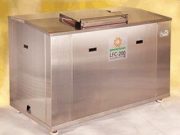Guest Columns
Home Guest Columns
 Green Lodging News provides a forum for anyone in the lodging industry to offer their take on a particular topic. All are welcome to participate. Submissions should be approximately 700 to 1,200 words and should include a photo of the writer. Authors can include a paragraph about themselves and their company at the end of the article. Contact Glenn Hasek, editor, at (813) 510-3868, or by e-mail at: greenlodgingnews@gmail.com.
Green Lodging News provides a forum for anyone in the lodging industry to offer their take on a particular topic. All are welcome to participate. Submissions should be approximately 700 to 1,200 words and should include a photo of the writer. Authors can include a paragraph about themselves and their company at the end of the article. Contact Glenn Hasek, editor, at (813) 510-3868, or by e-mail at: greenlodgingnews@gmail.com. Energy Management 101
Start discussing a technical topic and watch as people’s eyes glaze over, even if those people are fully aware that it’s something they should be paying attention to. Embarking on a path toward a more sustainable and energy efficient hotel operation qualifies as one of these “glazed” subjects, so to eliminate any possibility of eyelid fatigue, let’s talk about this extremely important issue in terms of something just a bit more fun—golf.
A Golf Analogy
Tired of listening to your old college buddies boast about how well they’re scoring on the course, you finally decide to up your game. All indications...
Hotels Hit with Fees for Not Complying with Energy Benchmarking Rules
In the United States, 16 locations, ranging from entire state policies to county laws, require some type of energy benchmarking. Many regulations are new, and the cumbersome process is costing hotels thousands of dollars every year.
Energy benchmarking—the process of tracking a building’s annual energy use and using a standard metric to compare the building’s performance against past performance and to its peers nationwide—is gaining momentum as businesses and building owners see huge savings in crunching the numbers and making small adjustments to their energy use. But as more cities and states adopt annual benchmarking regulations, the new procedures and...
Improving Your Bottom Line with Refrigeration Maintenance
Hotel venues of all types contain many plug-in refrigeration and freezer units (“coolers”). Examples include plug-in refrigerators and freezers in kitchen/foodservice areas, vending machines, ice machines, beverage merchandisers, and the like. These appliances contain a condenser coil unit that is responsible for rejecting to the atmosphere the heat that is extracted from the enclosure being cooled. To do this job effectively, these coils need to have good airflow so that good heat transfer is achieved. Unfortunately, since the coils are exposed to the atmosphere, they become progressively clogged with dust and other debris over time (see photo at right...
Bipolar Ionization Technology & Indoor Air Quality
It’s no secret that the concerns towards the indoor air we breathe are growing, and as a result, people are doing something about it. That’s great news, because according to the Environmental Protection Agency (EPA), most Americans spend up to 90 percent of their time indoors. The EPA has also named indoor air quality as one of the top five health threats in the United States.
So why the increased apprehension towards indoor air quality (IAQ)?
The 2015 outbreak of Legionnaires Disease in New York City, which took 12 lives, was a wakeup call. But let’s look at evidence that affects...
Hotels Hit with Fees for Not Complying with Energy Benchmarking Rules
In the United States, 16 locations, ranging from entire state policies to county laws, require some type of energy benchmarking. Many regulations are new, and the cumbersome process is costing hotels thousands of dollars every year.
Energy benchmarking—the process of tracking a building’s annual energy use and using a standard metric to compare the building’s performance against past performance and to its peers nationwide—is gaining momentum as businesses and building owners see huge savings in crunching the numbers and making small adjustments to their energy use. But as more cities and states adopt annual benchmarking regulations, the new procedures and...
A Hotelier’s Reflection on Environmental Consciousness
Writing about environmental sustainability issues is not the most gratifying task. You are invited, dear reader, to please continue reading, though. This article does not attempt to stimulate guilt or parent-ego induced finger wagging. What follows are insights, learnings, thoughts and musings from a hotelier viewing the impact—particularly the hospitality industry’s impact on the environment. These thoughts are based on insights stemming from eight years of hospitality related environmental sustainability consulting work. It is stating subjective observations about possible changes in value perception of a person, a profession and an industry.
Hotel Business
A hotel is an organization or economic system...
How The Peninsula New York Topped the Hotel Category in the Zero Waste Challenge
The results of the New York City Mayor’s Zero Waste Challenge were recently revealed, with The Peninsula New York emerging tops in the hotel category. The Peninsula was able to double its diversion rate in just a few months during the Challenge, in the process, emerging as a role model just in time for New York City’s new commercial organics rule.
Beginning July 19, 2016, certain New York City businesses are required by law to separate their organic waste for beneficial use (composting, anaerobic digestion or other). Among those affected are food service establishments in hotels with 150 or more...
Bio-digesters: One Highly Effective Way to Manage Food Waste Flow
Businesses care about the sustainability of our planet and they are seeking partners who also care about the planet. Business partners adapt this green initiative in choosing hotels for lodging and facilities where they will hold their conferences.
Change the light bulbs to LEDs. Put some solar panels on the roof. These are great steps to take to reduce your carbon footprint. But what do you do with your property’s food waste? A total of 1.3 billion tons of food is wasted annually worldwide. Sending solid food waste to a landfill can create more than 10 times the effect on...
Can Investing in Sustainability Fill Empty Hotel Rooms?
It’s no secret that the hospitality industry is competitive. Online ratings and reviews continue to be a crucial resource for consumers and the rise of the sharing economy has added a whole new element to the game. Hotel owners, executives and managers know how important it is to gain and keep a competitive advantage. They often ask themselves, “How do I bring new guests through the lobby doors while keeping past guests coming back time and time again?” The answer to that question just might be something unexpected: sustainability.
According to a recent survey conducted by Asia Pulp and Paper...
Best Practices for Recycling Solutions
In my 20 years of industrial design experience, it continues to surprise me how many people consider refuse collection to be an addition to a building rather than a core part of its design. As Director of Industrial Design at Rubbermaid Commercial Products, I am often tasked with helping hotels ensure waste is disposed of in the right bin—no small feat when you consider how much waste a hotel can generate on a busy day.
What are hotels to do when it comes to their refuse and recycling solutions? What are the common errors? Which bins work best in which...













